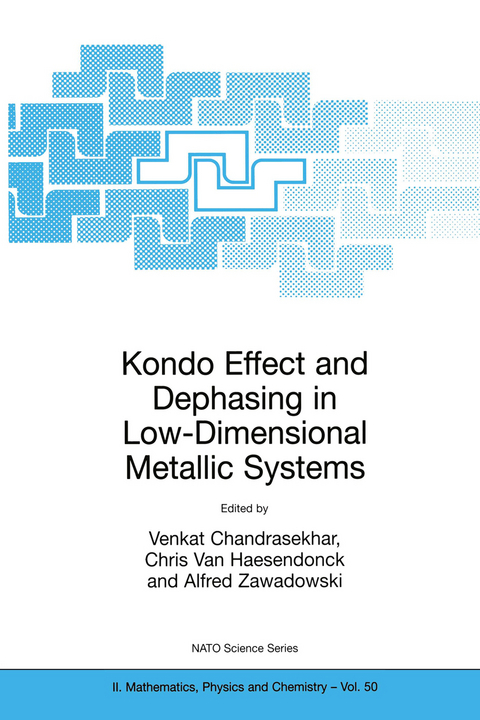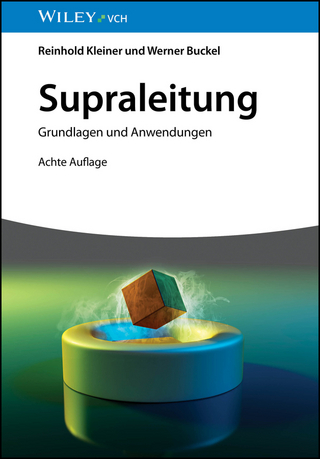
Kondo Effect and Dephasing in Low-Dimensional Metallic Systems
Kluwer Academic Publishers (Verlag)
9781402004018 (ISBN)
Effect of Disorder on the Kondo Behavior of Thin Cu(Mn) Films.- The Kondo Effect and Weak Localization.- Surface Magnetic Anisotropy of Kondo Impurities Induced by Spin-Orbit Scattering.- Thermopower of Mesoscopic Spin Glasses.- Shape-Induced Magnetic Anisotropy in Dilute Magnetic Alloys.- Zero-Bias Transport Anomaly in Metallic Nanobridges Magnetic field dependence and universal conductance fluctuations.- Conductance Noise and Irreversibility in Diluted Magnetic Semiconductors.- Enhancement of Kondo Temperature in Nanometer-Size Point Contacts.- Scanning Tunnelling Spectroscopy of A Single Kondo Impurity.- Two-Channel Kondo Effect from Tunneling Impurities.- Electron Decoherence at Zero Temperature The phenomenology and associated difficulties.- Probing Interactions in Mesoscopic Gold Wires.- Kondo Effect in Non-Equilibrium Theory of energy relaxation induced by dynamical defects in diffusive nanowires.- Tunneling through a Quantum Dot The out-of-equilibrium Kondo effect.- Electron Transport through Quantum Dots: An Unusual Kondo Effect.- The Kondo Effect in a Single-Electron Transistor.- Flux Dependent Dielectric Response of Stacked Nanoscopic Rings.- High-Frequency Response of Two-Level Systems in NixNb1-X Metallic Point Contacts.- Giant Magnetoresistance Of A Single Interface Magnetoresistance of Ag/Fe/Ag trilayers.- Fermi Edge Singularities in Transport through Quantum Dots.- Theory of Magnetoresistance in Films of Dilute Magnetic Alloys.- Current and Shot Noise in a Ferromagnetic Double Tunnel Junction with an Atomic Size Spacer.- Positive Domain-Wall Magnetoresistance of Ferromagnetic Point Contacts.- Enhancement of Kondo Effect Due to Spin-Singlet-Triplet Competition in Quantum Dots.- A Non-Kondo Interpretation of the Experimentally Observed “KondoResonances” in Quantum Dots.- Diagrammatic Theory of the Anderson Impurity Model with Finite Coulomb Interaction.- Generalized Conductance Sum Rule in Atomic Break Junctions.- Is CENISN A Kondo Semiconductor? Break-junction experiments.- The Influence of Single Magnetic Impurities on the Conductance of Quantum Microconstrictions.- Structural Properties of Colloidal Co Nanoparticles.- Interacting Electrons in a Nearly Straight Quantum Wire.- Resonant Tunneling through an Impurity Level: A Probe of Coherent States in a Disordered Metal.- Pair Breaking in S-Wave Superconductors by Two-Channel Kondo Impurities.- Theory of Scanning Tunneling Spectroscopy of Kondo Ions on Metal Surfaces.- Two-Level Systems in Atomic-Size Point Contacts.- Is the Multi-Channel Kondo Model Appropriate to Describe Single Electron Transistors?.- List of Observers.- List of Participants.
| Erscheint lt. Verlag | 31.12.2001 |
|---|---|
| Reihe/Serie | NATO Science Series II: Mathematics, Physics and Chemistry ; 50 |
| Zusatzinfo | XXII, 265 p. |
| Sprache | englisch |
| Maße | 160 x 240 mm |
| Themenwelt | Naturwissenschaften ► Physik / Astronomie ► Atom- / Kern- / Molekularphysik |
| Naturwissenschaften ► Physik / Astronomie ► Festkörperphysik | |
| Naturwissenschaften ► Physik / Astronomie ► Thermodynamik | |
| ISBN-13 | 9781402004018 / 9781402004018 |
| Zustand | Neuware |
| Informationen gemäß Produktsicherheitsverordnung (GPSR) | |
| Haben Sie eine Frage zum Produkt? |
aus dem Bereich


